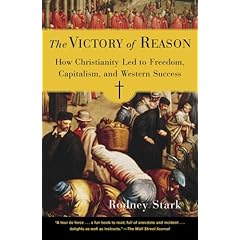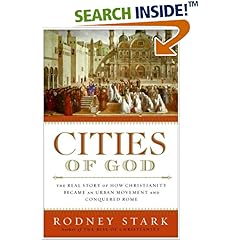A Reading from the New Perspective
Third Edition
By Don Garlington
Available from Wipf and Stock





 The Victory of Reason: How Christianity Led to Freedom, Capitalism, and Western Success (Random House, 2006). Stark contends that Christianity is a forward-looking religion, evincing faith in progress and in its followers' abilities to understand God over time. Such a future-based rational theology has encouraged the development of technical and organizational advances, such as the monastic estates and universities of the Middle Ages. Stark contends that these developments transformed medieval political philosophy so that democracy developed and thrived in those states, such as northern Italy, that lacked despots and encouraged moral equality. Stark concludes by maintaining that Christianity continues to spread in places like Africa, China and Latin America because of its faith in progress, its rational theology and its emphasis on moral equality. While some historians are likely to question Stark's conclusions, his deftly researched study will force them to imagine a new explanation for the rise of capitalism in Western society (from Publishers Weekly).
The Victory of Reason: How Christianity Led to Freedom, Capitalism, and Western Success (Random House, 2006). Stark contends that Christianity is a forward-looking religion, evincing faith in progress and in its followers' abilities to understand God over time. Such a future-based rational theology has encouraged the development of technical and organizational advances, such as the monastic estates and universities of the Middle Ages. Stark contends that these developments transformed medieval political philosophy so that democracy developed and thrived in those states, such as northern Italy, that lacked despots and encouraged moral equality. Stark concludes by maintaining that Christianity continues to spread in places like Africa, China and Latin America because of its faith in progress, its rational theology and its emphasis on moral equality. While some historians are likely to question Stark's conclusions, his deftly researched study will force them to imagine a new explanation for the rise of capitalism in Western society (from Publishers Weekly). The Rise of Christianity: How the Obscure, Marginal, Jesus Movement Became the Dominant Religious Force (Harper Collins, 1997).
The Rise of Christianity: How the Obscure, Marginal, Jesus Movement Became the Dominant Religious Force (Harper Collins, 1997). For the Glory of God: How Monotheism Led to Reformations, Science, Witch-Hunts, and the End of Slavery (Princeton University Press, 2004). In One True God: Historical Consequences of Monotheism, sociologist of religion Stark examined the nature of God, the wrath of God, the kingdom of God, the grace of God and the "chosen" of God. In this follow-up volume to his ambitious magnum opus, Stark investigates the role of monotheistic religions in reformations, witch-hunts, slavery and science. Such efforts represent an attempt by monotheistic religions to preserve the idea of the One True God against corrupting influences inside and outside the religions themselves. Stark asserts that, contrary to traditional notions, no single religious reformation can be isolated in any monotheistic religion. Thus, Christianity has experienced not simply the Reformation of Luther but many and various reformations that resulted in a diversity of sectarian movements that practice the worship of the One True God in their own ways. Stark also argues that science could have evolved only out of a monotheistic culture that viewed the world as God's handiwork, and that the witch-hunts of Europe could have taken place only in a culture marred by religious conflict and motivated by the desire to displace heretical religious sects. Despite its purported general focus on monotheistic religions, however, the book devotes very little attention to Islam or Judaism, a serious omission in a study that claims to cover so much ground. In addition, Stark's turgid prose and social-scientific style mar what otherwise could have been an engaging study (from Reed Business Information).
For the Glory of God: How Monotheism Led to Reformations, Science, Witch-Hunts, and the End of Slavery (Princeton University Press, 2004). In One True God: Historical Consequences of Monotheism, sociologist of religion Stark examined the nature of God, the wrath of God, the kingdom of God, the grace of God and the "chosen" of God. In this follow-up volume to his ambitious magnum opus, Stark investigates the role of monotheistic religions in reformations, witch-hunts, slavery and science. Such efforts represent an attempt by monotheistic religions to preserve the idea of the One True God against corrupting influences inside and outside the religions themselves. Stark asserts that, contrary to traditional notions, no single religious reformation can be isolated in any monotheistic religion. Thus, Christianity has experienced not simply the Reformation of Luther but many and various reformations that resulted in a diversity of sectarian movements that practice the worship of the One True God in their own ways. Stark also argues that science could have evolved only out of a monotheistic culture that viewed the world as God's handiwork, and that the witch-hunts of Europe could have taken place only in a culture marred by religious conflict and motivated by the desire to displace heretical religious sects. Despite its purported general focus on monotheistic religions, however, the book devotes very little attention to Islam or Judaism, a serious omission in a study that claims to cover so much ground. In addition, Stark's turgid prose and social-scientific style mar what otherwise could have been an engaging study (from Reed Business Information). Cities of God: The Real Story of How Christianity Became an Urban Movement and Conquered Rome (Harper Collins, 2006). Contemplating the rapid spread of early Christianity, Lucian the Martyr marveled in the fourth century that "almost the greater part of the world is now committed to this truth, even whole cities." To explain Christianity's remarkable success in capturing the cities of the Roman Empire, Stark deploys an empirical social science that exposes the flaws in previous historical theorizing. By parsing records of church construction, inscriptions on tombs, and names on imperial contract permits, Stark converts plausible conjectures into testable hypotheses about the growth of Christianity in the 31 largest Roman cities. And while some of the statistically validated hypotheses fit within conventional wisdom, others compel fresh thinking. The traditional belief that Christianity spread through mass conversion, for instance, gives way to a numerically substantiated dynamics of person-to-person conversion. And despite recent acclaim for the Gnostics as the true early Christians, the evidence links the Gnostic impulse to dying pockets of stubborn paganism, not the rising new faith. Like Stark's Victory of Reason (2005), this book will spark controversy--the kind that attracts curious readers. (Bryce Christensen).
Cities of God: The Real Story of How Christianity Became an Urban Movement and Conquered Rome (Harper Collins, 2006). Contemplating the rapid spread of early Christianity, Lucian the Martyr marveled in the fourth century that "almost the greater part of the world is now committed to this truth, even whole cities." To explain Christianity's remarkable success in capturing the cities of the Roman Empire, Stark deploys an empirical social science that exposes the flaws in previous historical theorizing. By parsing records of church construction, inscriptions on tombs, and names on imperial contract permits, Stark converts plausible conjectures into testable hypotheses about the growth of Christianity in the 31 largest Roman cities. And while some of the statistically validated hypotheses fit within conventional wisdom, others compel fresh thinking. The traditional belief that Christianity spread through mass conversion, for instance, gives way to a numerically substantiated dynamics of person-to-person conversion. And despite recent acclaim for the Gnostics as the true early Christians, the evidence links the Gnostic impulse to dying pockets of stubborn paganism, not the rising new faith. Like Stark's Victory of Reason (2005), this book will spark controversy--the kind that attracts curious readers. (Bryce Christensen). I have (finally) had the pleasure of reading through Nicholas Perrin's book Thomas: The Other Gospel. The pleasure was heightened by reading it on a sunny beach on the east coast of Australia and also reading it in a small country town located amidst 65 wineries and sipping the local produce as I slowly read over the pages.
I have (finally) had the pleasure of reading through Nicholas Perrin's book Thomas: The Other Gospel. The pleasure was heightened by reading it on a sunny beach on the east coast of Australia and also reading it in a small country town located amidst 65 wineries and sipping the local produce as I slowly read over the pages. For Perrin, the Gospel of Thomas is not Gnostic, rather it is a late second-century document from Syrian Christianity that exhibits features of Encratism, Hermeticism, and realized-eschatology via the influence of Tatian. To this end he draws on several areas of evidence including: evidence for the misunderstanding of sounds from a Syriac original in translation of the text into Greek and Coptic; evidence for Syriac catchwords and redaction; most Thomasine sayings follow the order in the Diatessaron; Thomas reflects Syrian asceticism associated with Tatian; Thomas draws on Tatian's logos theology; and the soteriology of Thomas reflects Tatian's own view of salvation as something essentially internal. Viewed in this light, the Gospel of Thomas should be viewed in Christian origins as part of the puzzle deriving from late second century Syrian Christianity.
This is a good introduction to the Gospel of Thomas for anyone interested. I find Perrin's proposal quite attractive, but confess that I remain agnostic about his overall thesis. I think the strength of Perrin's argument is that he makes a strong case for a Syrian provenance for Thomas, the Diatessaron may have been the first or only Gospel-like piece of literature available in Syriac at the end of the first century, the reconstruction of common catchwords in Syriac is suggestive of a Syriac original for Thomas, and perhaps the order of the sayings in the Diatessaron in comparison with Thomas is a plausible indication of dependency. On the other hand, an original Greek text for Thomas is not impossible esp. since we do have Greek fragments. Composition in Greek would have also made the document easier to spread to different environments outside of Syria as well. Basically there are simply too many unknowns in the equations to be decisive about the original language of Thomas, esp. when we are talking about texts which we do not have access too. Like many others, I am simply not qualified to be able make an informed decision about matters pertaining to Syriac, Coptic and the Diastessaron in order to be able to either affirm or disagree with Perrin's proposal in full. I also wonder about the possibility of Thomas echoing intra-Jewish debates of a former period given the reference to James and circumcision which occur in polemical contexts. Likewise, I am unconvinced that in logion 13 that Simon Peter is a cipher for the Gospel of Mark. I think Matthew and Peter both represent Jewish Christianity. Also ascetic practices were not limited to eastern Syria as vegetarianism was an issue in Romans and sexual abstinence in 1 Corinthians. The Gospel of John and its relationship to Thomas remains a burning issue that any theory on Thomas must account for, e.g. are Johannine traditions found in Thomas (R.E. Brown), is there a John vs. Thomas polemic going on (G.J. Riley), if Thomas cites the Diatessaron why the absence of Johannine material (Mark Goodacre). That being said, if Perrin is correct then there's a lot of North American scholarship that can be taken to the trash-can for good. I think Perrin's most enduring contribution will be his arguments for a Syrian origin for Thomas in the last quarter of the second century and he has made Tatian and the Diatessaron a plausible source for Thomas as well.
Mark Goodacre coveniently lists the reviews of Perrin by David Parker, Paul-Hubert Poirier, Robert Shedinger, Peter Williams, and see also the in-depth critical interaction from April DeConick.




|
You’re St. Melito of Sardis! You have a great love of history and liturgy. You’re attached to the traditions of the ancients, yet you recognize that the old world — great as it was — is passing away. You are loyal to the customs of your family, though you do not hesitate to call family members to account for their sins. Find out which Church Father you are at The Way of the Fathers! |
|
You’re St. Justin Martyr! You have a positive and hopeful attitude toward the world. You think that nature, history, and even the pagan philosophers were often guided by God in preparation for the Advent of the Christ. You find “seeds of the Word” in unexpected places. You’re patient and willing to explain the faith to unbelievers. Find out which Church Father you are at The Way of the Fathers! |